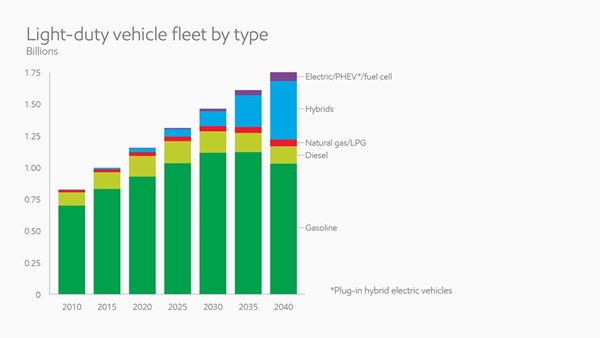Expanding Global Middle Class Equals Growing Energy Demand
There is a clear correlation between economic growth and energy use, or put more mathematically—total people times higher living standards equals greater energy needs.
There is a clear correlation between economic growth and energy use, or put more mathematically—total people times higher living standards equals greater energy needs.
Larry Gros, ExxonMobil Chemical’s global polymer products and applications technology manager, shared those insights and more at injection molding machine and automation supplier Engel’s first ever North American Trend.Scaut Automotive event, held in Livonia, Mich., at the end of June (read more here and here).
Gros presented ExxonMobil’s Outlook for Energy to 2040—an exhaustive review of what types of energy would see what level of demand from all over the world. From 2014 to 2040, the energy and chemical company sees global energy demand rising by 25%, noting that:
All the world’s energy sources will be needed to meet rising demand to 2040, but there will be a marked shift toward cleaner fuels, particularly natural gas.
While other energy sources make gains, Gros noted that oil will remain the top energy source for transport and for chemical production, with natural gas demand growing more than any other source.
Other key themes explored by Gros included the fact that energy is fundamental to living standards, and because of this, developing nations—which will lead in growth of GDP and living standards over the forecast window—will also lead in growth of energy demand over that time.
In the U.S., per capita energy consumption equates to 7 equivalent oil gallons per day, while globally, the average is only 1.7 gallons per day. “We will quickly see issues if rest of world grows into U.S. levels of consumption,” Gros noted, adding that, “as technology advances, it will improve efficiency and mitigate energy consumption growth.”
Developing World Develops
In 2014, more than half the world’s global GDP of $72 trillion could be attributed to advanced OECD countries, but the fastest growth rates were occurring outside those states, in nations like Turkey, Iran, Egypt, Saudi Arabia, and South Africa. ExxonMobil forecasts that by 2040, global GDP will more than double to $150 trillion, with all countries making gains, but the fastest rates experienced outside the OECD.
In fact, by 2040, Gros said developing countries will officially account for more than half of global GDP, with China and India expanding at rates of 5% and 5.5%, while the OECD at large grows at a rate of 2% over the forecast period. The greatest growth on a demographic basis, will occur within the middle class, which is forecast to more than double to five billion people by 2030, with the majority of that growth once again coming in India and China. By 2040, 85% of the world’s population will live in urban centers in OECD countries, as the globe adds the equivalent of 30 Chicago's during this period.
Efficiency Gains Allow OECD to Do More With Less
Even though overall energy demand will expand by 25% across the globe by 2040, it will be flat in OECD countries, as efficiency gains allow these countries to do more with less. Meanwhile, the 1.2 billion people without access to electricity today will finally start to join the global energy market. As they do, Gros said oil and gas will remain the world’s primary fuels through 2040, but sources of energy will shift. Particularly for coal, which will see its share of demand drop from 26% to 20%, while renewable sources, natural gas and nuclear grow.
Emissions to Flatten, Decline
In terms of emissions, Gros said ExxonMobil is predicting that global carbon dioxide output will peak at 2030, and begin to decline afterwards, with emissions falling 20% in OECD countries through 2040.
Fuel Standards Globalize
Transportation remains a key driver for energy demand, and Gros noted that the advent of stricter fuel standards globally will have a huge impact. “In 2008, only four countries had mandatory fuel economy standards, while some others had voluntary ones,” Gros said. “In 2014, many more adopted regulations, and now about 90% of light duty demand is in countries with standards or developing standards.”
Gros said global demand for light duty vehicles will peak in 2020, but added that there will not be fewer cars—with a global fleet of 1.7 billion by 2040—just that tomorrow’s cars will be more efficient (he also said China will surpass the U.S. in 2025 as the country with the most vehicles). Part of that efficiency will come from resins. Gros explained that without plastics, current vehicles would be about 10% heavier, adding that that 10% weight reduction leads to about a 7% improvement in fuel economy.
Instead of electric vehicles, Gros and ExxonMobil expect to see a big jump in hybrid vehicles, with those accounting for one quarter of the global fleet by 2040.

Related Content
Delivering Increased Benefits to Greenhouse Films
Baystar's Borstar technology is helping customers deliver better, more reliable production methods to greenhouse agriculture.
Read MoreFungi Makes Meal of Polypropylene
University of Sydney researchers identify two strains of fungi that can biodegrade hard to recycle plastics like PP.
Read MoreNew Facility Refreshes Post-Consumer PP by Washing Out Additives, Contaminants
PureCycle prepares to scale up its novel solvent recycling approach as new facility nears completion.
Read MorePrices Flat-to-Down for All Volume Resins
This month’s resin pricing report includes PT’s quarterly check-in on select engineering resins, including nylon 6 and 66.
Read MoreRead Next
People 4.0 – How to Get Buy-In from Your Staff for Industry 4.0 Systems
Implementing a production monitoring system as the foundation of a ‘smart factory’ is about integrating people with new technology as much as it is about integrating machines and computers. Here are tips from a company that has gone through the process.
Read MoreLead the Conversation, Change the Conversation
Coverage of single-use plastics can be both misleading and demoralizing. Here are 10 tips for changing the perception of the plastics industry at your company and in your community.
Read MoreMaking the Circular Economy a Reality
Driven by brand owner demands and new worldwide legislation, the entire supply chain is working toward the shift to circularity, with some evidence the circular economy has already begun.
Read More


























